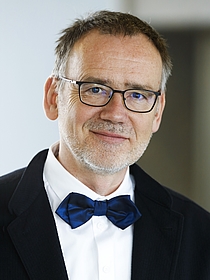Welcome from the Goethe-University Frankfurt
Dear Ladies and Gentlemen, dear Colleagues,

It is my pleasure to be able to welcome you here at the Goethe-University in Frankfurt and I am also proud to pass on the greetings from the head of the University.
Nowadays universities in Western Europe actually host more students than ever before. This is not due to an increase in the population of European nations, but to the fact that a greater number of school-leavers want to go to university.
It is of course easier to educate students who have already „learned to learn“ at school. However, even though the proportion of people interested in going to university is rising, the student’s ability in and the enthusiasm for learning is not necessarily increasing in the same way – so we run the risk that the average in motivation is sinking. As a result of this, universities today have to organise supplementary programs, e.g. courses in mathematics or text writing. They also help their students to organise themselves and their study – an example in Frankfurt and at other universities is the „Nacht der aufgeschobenen Hausarbeiten“, the night of the postponed assignments. Just before the end of the term some rooms at the university are opened for the whole night. Students who haven’t yet prepared their assignments are given the opportunity of doing this as a group with others in the same predicament.
Giving advice is easy when the one who needs advice realises the need for help. But students who gradually end up in a situation where they are not able to follow the progression of the course may not recognise the moment when help is needed. Moreover, in most cases teachers or tutors are not able to control the progress of every students learning. It would actually be advisable and preferable to evaluate this progress more frequently over shorter periods, but this would be complex and time-consuming. Therefore, it seems likely that a computer-based solution for monitoring the study-progress could remedy this. Moreover, tests constructed using the facilities given by computers allow the integration of adaptive exercises – and this would open opportunities to increase student motivation and ensure more reliable results.
Unfortunately, this is causing a lot of concern too. Some students generally do not appreciate
when their progression – or lack of it – during the study-program is discovered by their teachers if the data is transferred from the machine to them. Other students would accept that their progress is controlled, but they fear the merging of the data from exams with other personal data that is already available.
Therefore, this topic needs to receive a lot more consideration by University staff and in the discussions with other universities. We certainly do need more data about the progress of our students, about their abilities and their interests to improve our student advisory service and to develop our examination methods. But we need to take the doubts of our students into account: For that at first, we need an absolutely safe construction to collect and store the data. And we need rules which describe what kind of data would be visible to which group of the universities’ staff and which would not. And finally, if data would be allowed to be used for research if made anonymous. All these tasks could be summarized under the idea of Trusted Learning Analytics.
In my view these are topics we should not neglect because they will influence what a university will be like in the future. I am glad that this discussion will be part of the work of your community and this conference. Moreover, due to the fact that we are delighted that this conference – the 10th anniversary conference – is located at our University, the Goethe University in Frankfurt. This is in accord with the development of the University towards seeing digital topics in research and teaching as a core area.
Prof. Dr. Roger Erb,
Vice President, Department of Physics Education,
Goethe-University Frankfurt
